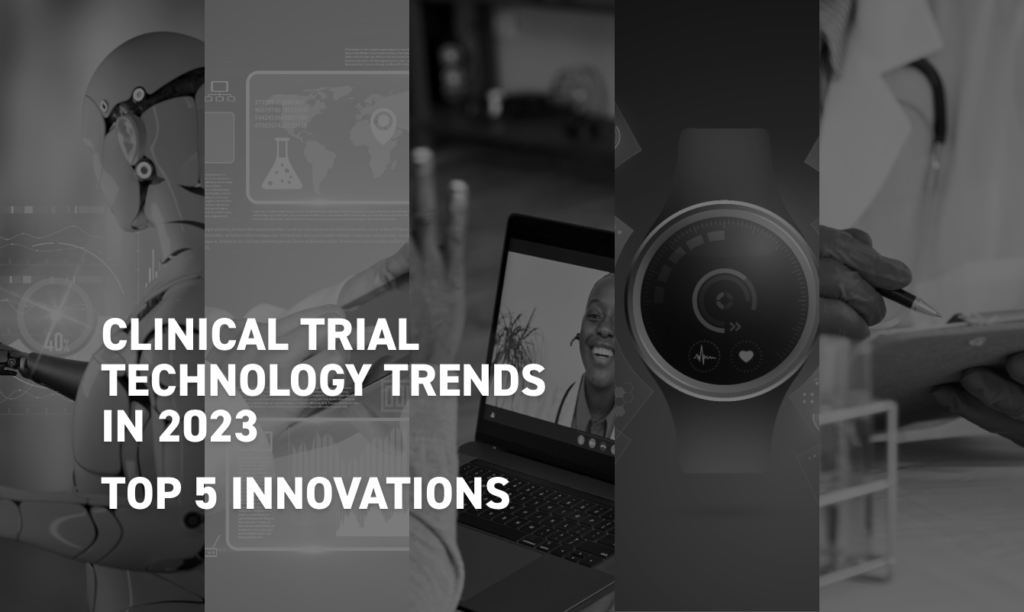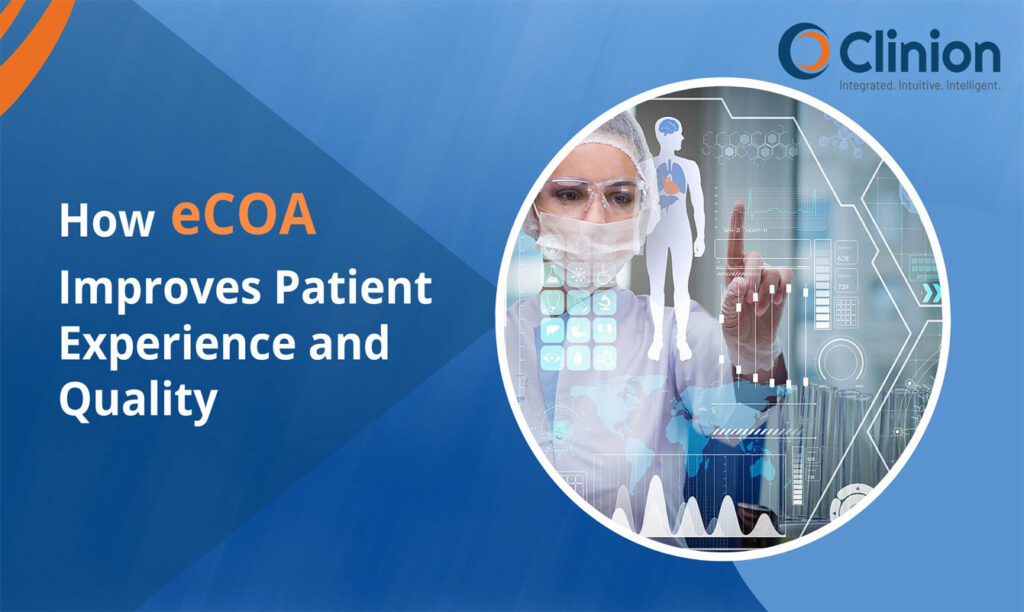Benefits of Using an Electronic Data Capture (EDC) System in Clinical Trials

Recent Articles AI-Powered Clinical Data Validation: Ensuring Accuracy, Efficiency, and Compliance September 21, 2024 Read More AI in Clinical Trials: Key to Accelerated Timelines & Reduced Costs July 29, 2024 Read More Simplifying eCRFs: A Look at the Future of Clinical Data Management July 8, 2024 Read More Benefits of Using an Electronic Data Capture (EDC) System in Clinical Trials Clinion Team / March 25, 2023 Clinical trials are the bridges between ideas born in theory and their real application in the healthcare industry. These trials are dynamic processes that evaluate the efficacy, and safety of novel medical therapies while ensuring they reach patients on time. Earlier, the collection and assessment of data for these trials was done using a paper-based Case-Report Forms (CRFs), which resulted in a cumbersome and time-consuming process. With the advent of technology, the traditional methods are being replaced with efficient methods like the adoption of electronic data capture (EDC) systems. What is an Electronic Data Capture System in Clinical Trials? Electronic Data Capture (EDC) system in clinical trials is a software product enabling a streamlined and efficient collection, management and analysis of data electronically. This system ensures the security and authenticity of the data while improving accessibility. Unlike the traditional paper-based Case-Report Forms (CRFs), an EDC system is a comprehensive tool that effectively eliminates the concerns related to: Data integrity due to human error The enormous pressure associated with paper-based documentation The lengthy duration of clinical trials Offering these advantages, EDC has emerged as a crucial technology that can be widely used in pharmaceutical companies, healthcare institutions and clinical research organizations (CROs). What are the Benefits of Electronic Data Capture (EDC)? Medical device and pharmaceutical companies have started incorporating electronic data capture (EDC) systems for the optimization and maintenance of the data acquired during clinical trials. The EDC system has fundamentally changed the way clinical trials are performed, making it important to understand the benefits that it brings along. The five benefits of using EDC systems for capturing data electronically in clinical trials have been mentioned below. Enhanced Data Quality Electronic Data Capture systems significantly enhance data quality. It minimizes errors due to manual data entry and transcription through in-built validation and edit checks. Real-time monitoring of the data allows the user to detect discrepancies ensuring their accuracy and credibility. Inconsistencies are automatically flagged and this helps in guaranteeing that the data is correct and reliable. Efficient Data Management An EDC system provides a centralized platform that offers real-time access to authorized individuals which simplifies the process of data collection, input, storage, retrieval and organization. This optimizes the data workflow and consistency, promotes collaboration, avoids data silos and is time efficient. Safety and Credibility The data security is greatly prioritized in an EDC system. The data is stored in a secure cloud storage which avoids data breaches, loss of data and fragmentation. Only authorized individuals can access the data and carry modifications, ensuring transparency and accountability at every stage. Accessibility The electronic data capture serves as a storehouse for unified data which only users with authorization can access. This enables researchers, regulatory authorities and associated institutions to study and analyze the data in real-time, and in turn, enhance communication, collaborative insights and decision-making. Accessibility fosters synergism among the associated individuals and it creates an enhanced workflow with positive outcomes. Cost Effective and Efficient By ensuring enhanced quality of the data through streamlined operations and remote monitoring, an EDC system minimizes the time required for data preparation and cleaning. Elimination of paper forms and related manual tasks not only saves time but reduces the cost as well. Moreover, real-time access to the data avoids the laborious task of visiting the clinical trial sites and cuts down on travel expenses. Evolution of Clinical Trials In the journey of progress, evolution is a constant companion. To adapt to the evolving healthcare landscape, it is necessary to update ourselves by embracing efficient technology. Electronic data capture is a key player in the advancement of medical science as it offers a multitude of advantages like enhanced data quality, efficient data management, security and accessibility. It favours a collaborative atmosphere enabling transparency, authenticity and well-informed decision-making. Further, the cost and time-effective nature of these systems also contribute to enhancing the efficiency of the clinical trials. Clinion offers the best-in-class, certified – EDC solution which enables automation and acceleration of clinical trials. The latest version of the Clinion EDC Platform is backed by AI and offers management of clinical trials across all phases with full transparency. The user-friendly interface supports the efficient collection, cleanup, reporting and accessibility of your clinical trial data. In short, our product is an all-in-one solution designed to optimize your research endeavors. Experience the Most Intuitive, Integrated EDC system powered by AI Contact Us
Clinical Trial Technology Trends: The Top 5 Innovations Shaping Clinical Trials in 2023

Recent Articles AI-Powered Clinical Data Validation: Ensuring Accuracy, Efficiency, and Compliance September 21, 2024 Read More AI in Clinical Trials: Key to Accelerated Timelines & Reduced Costs July 29, 2024 Read More Simplifying eCRFs: A Look at the Future of Clinical Data Management July 8, 2024 Read More Clinical Trial Technology Trends: The Top 5 Innovations Shaping Clinical Trials in 2023 Manuj Vangipurapu / March 10, 2023 Clinical trials play a crucial role in the development and approval of new medical treatments and drugs. As technology continues to advance, Clinical Trial Technology is becoming a more important factor in shaping the way trials are conducted. In 2023, we can expect to see several technology trends that are set to further revolutionize the design, conduct, and analysis of trials. Some of these trends include decentralized trials, wearable devices, machine learning, and Risk-Based Quality Management (RBQM). Growing Use of Machine Learning and AI AI and Machine learning are becoming increasingly important in clinical trials, as they provide a way to analyze large amounts of data and make predictions about outcomes. From identifying potential trial participants to predicting patient responses to treatment, Machine Learning can help make clinical trials more efficient and effective. Additionally, these technologies can help automate routine tasks, freeing up time and resources that can be used to focus on other aspects of the trial. Some of the AI & ML applications in clinical trials include eProtocol Design, eCRF Design, Medical Coding, DB Creation, Data Analytics, CSR Automation, SDV, Site Selection, SDTM Mapping, RBM, Query Management and Chatbots. To take advantage of these benefits, CROs and Pharma companies should consider partnering with technology companies that specialize in Machine Learning and developing or integrating Machine Learning algorithms into their clinical trials. Expansion of Decentralized Trial Models Decentralized trials, also known as remote trials, are changing the way clinical trials are being conducted by allowing for more flexible and patient-centered study designs that facilitate the collection of data from patients remotely in real-time. By using technologies like telemedicine, remote monitoring, and electronic consent, patients can participate in clinical trials from the comfort of their own homes, without the need for frequent visits to a physical trial site. This not only makes it easier for patients to participate in trials, but it also enables trials to be conducted more efficiently, with fewer missed visits and less time and money spent on travel and site visits. CROs and Pharma companies can leverage decentralized trials to increase patient engagement and participation, streamline trial processes, and reduce costs. By investing in telemedicine and remote monitoring technologies, they can help ensure that trials are conducted as efficiently and effectively as possible, while still providing effective patient care and safety. Adoption of Digital Patient Engagement Tools Clinical trials have greatly evolved with the integration of digital patient engagement tools. These tools have proven to be invaluable in enhancing the patient experience while simultaneously providing valuable insights into patient behavior and their experiences. Not only do they increase patient engagement and satisfaction, but they also simplify trial processes and promote better compliance and patient retention. To fully harness the potential of these advanced engagement tools, pharmaceutical companies and CROs should consider collaborating with technology firms that are experts in digital patient engagement solutions. It’s also important for these companies to prioritize user-friendliness and engagement when developing or selecting these tools, so that patients are eager to participate and provide valuable data. Rise of Wearable Devices and Sensors Wearable devices, such as fitness trackers and smartwatches, are becoming increasingly important in clinical trials, as they provide a way to collect real-time data on patient behavior and health. From tracking physical activity to monitoring vital signs, wearable devices can help researchers gather valuable data that can be used to improve the efficacy and safety of new medical treatments. To leverage the potential of wearable devices, CROs and pharmaceutical firms may consider partnering with wearable device manufacturers or integrating wearable device technology into their clinical trials. RBM to RBQM: A Step Forward in Clinical Trials Risk-based monitoring (RBM) is becoming increasingly popular in clinical trials, as it allows for a targeted and efficient approach to monitor trial data. However, RBQM (Risk-Based Quality Management) takes this a step further, incorporating a risk-based approach into all aspects of trial management, from protocol development to data management and analysis. RBQM ensures that resources are targeted where they are needed most, resulting in a more efficient and effective clinical trial process. Automate Your Next Study With Our AI-Enabled eClinical Software Request A Demo
Taking Medical Coding to the next level with AI and Machine Learning

Recent Articles AI-Powered Clinical Data Validation: Ensuring Accuracy, Efficiency, and Compliance September 21, 2024 Read More AI in Clinical Trials: Key to Accelerated Timelines & Reduced Costs July 29, 2024 Read More Simplifying eCRFs: A Look at the Future of Clinical Data Management July 8, 2024 Read More Taking Medical Coding to the next level with AI and Machine Learning Manuj Vangipurapu / Dec 20, 2022 Accuracy in medical coding is a vital aspect in aiding clinical trial operation success. It has presented an excellent opportunity for medical coders, working hand-in-hand with AI-enhanced computer-assisted coding systems, to quickly identify and validate the correct codes. Using natural language processing (NLP) and advanced Machine Learning algorithms, AI is transforming medical coding by improving coding accuracy. In this blog, we’ll explore what this transformation means for clinical trial organizations. What is Medical Coding? Medical coding is a critical process that involves assigning standardized codes to medical terms in clinical trial participant medical records, diagnoses, and procedures in order to accurately track and record a patient’s treatment data and that the research study is conducted ethically and efficiently. The medical coder will conduct searches in dictionaries (such as MedDRA, and WHO DRUG) to associate it with the right code in order to submit treatment results to regulatory authorities. Why do you need AI-assisted Medical Coding? Medical coders typically spend over 200 hours per month on repetitive tasks, which translates to a significant amount of time and cost. Thankfully, AI and Machine Learning are making their way into the medical coding world and are expected to improve efficiencies significantly by reducing the amount of manual labor that goes into coding patient data. AI medical coding reduces the time to code and reduces human errors leading to a reduction in study duration and costs. All of this helps bring drugs to the market faster and enables patient well-being. Benefits of AI Medical Coding Increased Accuracy: AI medical coding acts as a guidance system for electronic health records (EHRs) that works at superspeed, to ultimately improve a clinician’s accuracy. It provides an idea of what codes are being generated via documentation, allowing clinical trial teams to fix their notes if the data doesn’t apply to a specific patient encounter. Faster Coding: With the power of AI, companies can cut coding turnaround by days, not hours or minutes. This is owing to AI’s ability to quickly and intelligently map terms within the patient data with the right codes and provide suggestions to a coder to approve. This enables medical coders to simply accept the suggested term or choose from a list of suggested terms. Once a term has been accepted, all same terms in the study are automatically coded with the accepted term. This automation greatly reduces coding timelines. Reduce Risk: AI Medical Coding is helping organizations to streamline their coding processes, reduce errors, and ensure that the proper codes are being used for each term. This reduces the risk of incorrect coding, improving data quality and study outcomes. Future of Clinical trials AI Medical Coding In the recent few years, AI has been the go-to when it comes to clinical record keeping. AI medical coding has paved the way for translating patients’ complex symptoms, and clinicians’ efforts to address them, into clear and unambiguous classification codes, with precision and speed. AI can act as a strategic partner for clinical trial teams worldwide, maintaining decades of patient data and transforming trial models to best suit futuristic clinical research. Based on that, AI in clinical trials is only set to grow, especially in the realm of medical coding. Clinion specializes in AIML technologies that are transforming the medical coding process in the clinical trials industry. To learn more on why clinical trial organisations should consider embracing this cutting-edge technology, hop onto our website now!
What makes decentralization the future of clinical trials?

Recent Articles AI-Powered Clinical Data Validation: Ensuring Accuracy, Efficiency, and Compliance September 21, 2024 Read More AI in Clinical Trials: Key to Accelerated Timelines & Reduced Costs July 29, 2024 Read More Simplifying eCRFs: A Look at the Future of Clinical Data Management July 8, 2024 Read More What makes decentralization the future of clinical trials? Deblina Dam / Nov 14, 2022 With the emergence of COVID-19, Decentralization of Clinical Trials became necessary to comply with social distancing requirements while carrying out clinical research. Over the past few years, the clinical trial landscape has shifted its focus to patient-centric practices to promote patient engagement. But now as the pandemic is long gone, it is time to reflect on how DCT studies are genuinely addressing long-standing issues in research and development for sponsors, study teams, and of course, the patients! The digital shift in clinical trials has brought about the potential to improve both patient experience and clinical data quality significantly. Understanding the direct implications of decentralized approaches can positively impact research outcomes, allowing CROs to take the first step toward the future of clinical trials. DCTs have paved the way for the clinical trial industry to adapt quickly to meet consumer needs while mitigating risks and maintaining participant safety. What is a decentralized clinical trial? Decentralized clinical trials involve a combination of innovative technologies with a patient-centric study design to communicate with study participants and collect data for conducting clinical studies using a hybrid approach. DCTs leverage remote monitoring and data capture technologies such as eConsent, eDairies, ePRO, Tele Consulting, Direct-to-Patient, Wearables, etc. to make participating in clinical trials easier. The primary goal of DCT is to provide a hybrid, flexible system that can promote high patient engagement. By reducing drop-out rates, and increasing study effectiveness, DCTs ultimately reduce time-to-market for life-saving medicines – positively impacting millions of potential patients. Traditional trials vs Decentralized trials Here’s a stage-wise comparison between a conventional and decentralized clinical trial: Stages Traditional Decentralized Patient Selection Site-centered advertising targeting local participants Digital advertising, allowing CROs to reach a diverse patient population. Participant consent In-person consent, via physical signature E-consent (digital consent signature) form patients located far away from the site Screening In-person physical tests Tele-consultation and home visits by medical personnel and nursing staff Enrollment In-person recruitment Virtual recruitment Treatment and follow-up On-site treatment and check up where patients have to visit the site Home healthcare and teleconsultation. Remote monitoring by devices and self-care platforms Patient retention Low – due to scheduled in-person patient visits High – as it allows remote trial participation for patients, via Telemedicine Study conclusion Delayed – Requires final in-person visits Faster conclusion – Returning of study equipment signifies the end of the clinical study Why decentralized clinical trials are the way of the future? With the growing need for accelerated drug development, traditional site-centric clinical trial models have evolved to handle consumer requirements during unforeseen events. According to recent data published by the Globaldata Pharma Intelligence Center, decentralized or remote clinical trials have successfully brought research closer to the patients, with an overall increase of 1.3% of all trials in 2011 to 2.5% in 2020.The decentralized model has several advantages over the traditional, centralised model of clinical trials. Allows for a greater geographical reach, which is important for enrolling a diverse group of participants. Eliminates the need for travel, which can be a barrier to participation. Enables site staff to be more directly involved in the trial, which can improve retention and compliance. Conclusion High-quality clinical research outcomes can only be achieved when clinical excellence and technology are combined. Choosing Clinion eClinical platform is the key to opening the treasure box of tangible decentralized components that when incorporated into your study can enable you to reach out to a diverse patient base, increase patient access and streamline data collection. From ensuring compliant delivery and reducing the patient burden to increasing patient engagement, Clinion’s AI-enabled software can help you achieve successful DCT implementation via a seamless interplay of direct-to-patient services. If you are looking to expand trial capabilities, upgrade data quality, and increase patient compliance rate, then choose the right eClinical platform to optimise regulatory strategy and new processes and leverage futuristic data-management models, today. To get started with Clinion integrated DCT platform, reach out to our experts! Contact Us
How eCOA Improves Patient Experience and Data Quality

Recent Articles AI-Powered Clinical Data Validation: Ensuring Accuracy, Efficiency, and Compliance September 21, 2024 Read More AI in Clinical Trials: Key to Accelerated Timelines & Reduced Costs July 29, 2024 Read More Simplifying eCRFs: A Look at the Future of Clinical Data Management July 8, 2024 Read More How eCOA Improves Patient Experience and Data Quality Clinion Team / Oct 17, 2022 With the rising demand for improving patient safety in clinical trials, the adoption of patient-centric solutions is considered the best route to enhance data accuracy and experience automated workflows. This is where eCOA comes into play. In this blog post, we will find out how electronic clinical outcome assessments are helping the clinical trials industry handle the ever-growing list of patient data and, at the same time, reduce patient burden! What is eCOA? Electronic clinical outcome assessment (eCOA) refers to the process of leveraging technology to better capture data and enhanced Clinical Outcome Assessment (COA). Using devices like smartphones, tablets, and personal computers, eCOA allows patients and clinicians to report regular symptomatologie’s directly into a cloud system. It records the patient’s body functioning, alerts them to make a diary entry, and improves the understanding of the patient’s experience. Moreover, it also measures the efficacy of a health intervention conducted by CROs worldwide. . eCOA system technologies are often used by clinical trial patients to remotely send Electronic patient-reported outcome (ePRO) experience and symptoms directly to site staff. s Data gathered by an ePRO include patient-provided information about symptoms, side effects, drug timing, and questions during the clinical trial that can be tracked on any electronic device. According to a recent study published on the Data Bridge Market Research website, the Global Electronic Clinical Outcome Assessment (eCOA) market is projected to grow 16.30% from 2022 to 2029, to a whopping $4.08 billion, thanks to the enhanced protocol adherence, lowered trial risks and assured patient safety and participation that eCOA has to offer. As a drug enters the market, it is imperative to understand how they impact patients and their health profiles. eCOA tracks health behaviours like information on exercise, smoking, and drinking. It assesses patients’ responses to monitor health behaviours over time. Let’s find out the top advantages of using eCOA in conjunction with quantitive clinical data to determine patients’ experience with a disease and treatment more accurately. Improved Patient Experience The use of eCOA has been proven to refine site and user compliance. The patient-centric approach of eCOA provides flexibility to participants to complete their from anywhere, whether at home or from a clinic. It builds efficiencies and creates avenues for time, resources, and cost optimization. Voluminous clinical trial data gets efficiently gathered with eCOA. The following pointers lay further emphasis on the user-friendliness and personalised experience that eCOA has to offer clinical trial patients. The communication between patients and clinical staff increases through eCOA, resulting in more patients reporting regular events. Patients and healthcare workers can consistently and accurately record observations. The patient stays motivated and engaged with the clinical trial consistently, leading to better data gathering. Patient adherence. The electronic time stamping in eCOA removes doubt over adherence to a planned schedule and encourages the user to complete it on time. Patients cannot skip questions or enter inconsistent or conflicting information. It makes studies more accessible for patients living far away from traditional academic study centres and participants with other life circumstances that make frequent clinic visits challenging. eCOA ensures that every patient faces the same questions in the same sequence at every visit without bias, leniency, variation, interpretation, or mood. Enhanced clinical Data Quality. Thanks to eCOA, monitoring of eClinical data is just a click away. The intrinsic benefits of digitization abound with eCOA can allow you to time stamp confidential data to easily track daily patient diaries. Check out the following list of advantages to get a deeper insight into how the eCOA platform has been helping CROs cut down the middlemen by working with translators directly, create agile study development models enjoy rapid deployment using a pre-built library to enhance patientricity. eCOA Meets Global Regulatory Standard. It is Attributable, Legible, Contemporaneous, Original, and Accurate (ALCOA) and accepted by regulatory agencies. Each user in the electronic report system has a unique ID. It maintains data confidentiality and indicates the completion of the questionnaire. Password protection further keeps patients’ confidentiality intact. Automated servers and electronic backup systems keep data secure and allow an automatic audit trail within the electronic system. They have reduced human error. Logical checks and real-time editing reduces erroneous data. Illegible handwriting or contradictory responses are eliminated. This reduces human error. eCOA Eliminates Transcription Errors. eDiaries are part of eCOA and capture data directly into the trial management system. Data quality is monitored in real-time at the data input stage, eliminating the need for repetition. eCOA also enables accurate timestamping and meets audit requirements. eCOAs electronic system that comes along with automatic calculation of diagnostic scores and reassured indication of red flags if there is a decline in the scores, has been making its mark in the clinical trials sector. The improved data collection, and reduction in variable endpoint parameters which has made way for eCOA to rise as the statistical power in the eClinical domain. You can execute clinical studies by enrolling fewer patients, which can ultimately promote tremendous cost savings. The above features are evident in several clinical studies conducted so far. Clinion eCOA effortlessly extends support to the patient’s homes while maintaining Data Integrity and Safety. eCOA can be easily integrated with the clinical trial management systems, backed by our support team at Clinion which ensures a smooth and easy transition. Speak to a Clinion representative to discover more about eCOA. Contact Us

